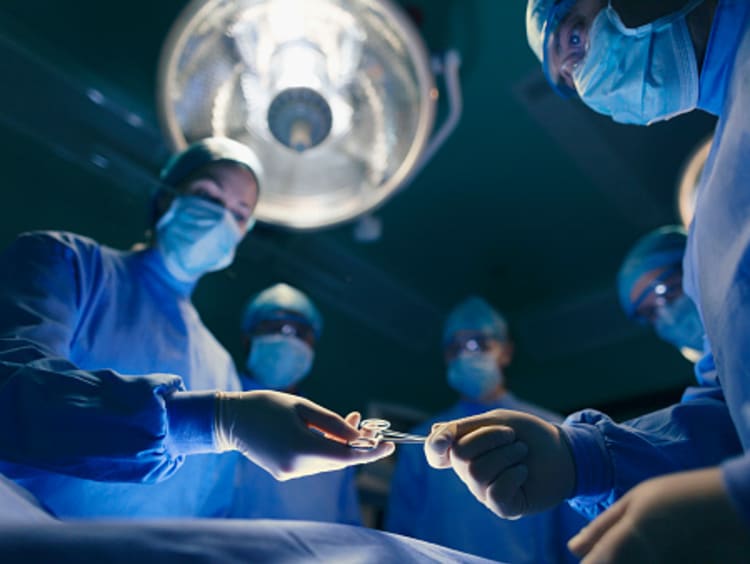- September 30, 2024
Weight-loss surgery may preserve kidney health more effectively than GLP-1 drugs

- In a new study, people with obesity, diabetes, and chronic kidney disease were less likely to see their kidney disease advance after bariatric surgery compared to people treated with GLP-1 drugs.
- Chronic kidney disease often develops as a result of type 2 diabetes that occurs when someone has obesity, and is a major cause of mortality from diabetes.
- In addition to reducing the size of a person’s stomach, bariatric surgery also produces metabolic changes that reduce hunger.
For people with obesity and chronic kidney disease, bariatric surgery is significantly more closely associated with a decrease in the progression of kidney disease than treatment with GLP-1 drugs for diabetes. This is the finding of a new study from the Cleveland Clinic.
In the study, individuals treated with bariatric surgery had a 60% lower risk of the progression of kidney impairment, and a 44% lower risk of kidney failure or death.
Chronic kidney disease is a known major cause of further health problems and death in people with obesity and type 2 diabetes.
Bariatric surgery, one common type of which is gastric sleeve surgery, reduces the size of the stomach by about 80% through the removal of sections of the organ.
This has the effect of reducing the amount of food it takes for a person to feel full, and also results in metabolic changes that reduce their sense of hunger in the first place.
Both of these changes help resolve obesity, which is implicated in both kidney disease and diabetes.
The study involved 425 participants. Of these, 183 received surgery, while 242 received GLP-1 diabetes drugs, which also promote weight loss. Participants were followed for a median of 5.8 years.
The study is published in Annals of Surgery.
How obesity and diabetes affect the kidneys
Obesity is a condition that places an amount stress on all the body’s organs. It also increases the risk of type 2 diabetes.
Mir Ali, MD, a board-certified bariatric surgeon and medical director of MemorialCare Surgical Weight Loss Center at Orange Coast Medical Center in Fountain Valley, CA, who was not involved in the study, explained for Medical News Today that, additionally, type 2 diabetes — especially when blood sugar control is poor — can also negatively affect kidney health.
However, he noted, “this doesn’t mean that if you have diabetes, you’re definitely going to get chronic kidney disease, and you can also get chronic kidney disease without diabetes. There are some other conditions that can lead to that — some of it is hereditary, congenital issues.”
Is weight-loss surgery a first-choice treatment for kidney disease?
Raj Dasgupta, MD, FACP, FCCP, chief medical advisor for Fortune Recommends Health, was also not involved in the study, noted that “bariatric surgery isn’t usually the first choice for people with obesity and kidney disease, but it’s becoming more common for those with severe obesity, especially if they also have diabetes.”
Ali pointed out that as far as insurance companies go, there are qualifying requirements to get coverage for surgery.
Currently, a person must have a body mass index (BMI) of between 35 and 40 and have no other medical conditions to qualify for coverage in the United States.
“Now, there’s a lot of published data that this can be 5 [BMI] points lower. But unfortunately, even though that data has been out for some time now, the insurance companies have not adopted that criteria,” Ali told us
He added that GLP-1 treatments do not produce the helpful metabolic changes that a gastric sleeve does.
Still, Dasgupta pointed out that GLP-1 drugs “can still help control diabetes and weight, which benefits the kidneys, without the need for an operation.”
What metabolic changes does bariatric surgery cause?
If it seems counter-intuitive that surgery could change one’s metabolism, Ali explained why a gastric sleeve does just that:
“Certain hormones are produced in the stomach, and when we do a gastric sleeve, we’re removing a lot of those cells that produce hormones which are producing the sensation of hunger. One hormone that I can give an example of is a hormone called ghrelin, and ghrelin stimulates hunger. So when somebody diets, their ghrelin levels go up, and they feel hungrier. When they have the surgery, their ghrelin levels go way down. They don’t feel hungry, and when they do feel hungry, it takes a lot less food to satisfy that hunger.”
During a bypass, surgeons reroute the patient’s digestion around areas that stimulate such hormones, changing the individual’s metabolism.
“These changes improve overall health and protect the kidneys by controlling diabetes and other factors that can damage them,” Dasgupta said.
Does surgery lead to more durable weight loss?
In addition to the benefits for chronic kidney disease reported in the study, Ali said, “there are a lot of other studies showing how weight loss surgery is more durable than any medications available right now.”
He explained that a BMI of 40 is associated to roughly 100 pounds, or 45 kilograms, overweight. Therefore, weight-loss success is defined as someone losing at least half that weight and keeping it off for at least 5 years.
“The long-term success with diet and exercise alone is about 2–5% — very, very low,” Ali told us. “The long-term success with surgery is more on the order of 80%.”
He noted that the long-term success of GLP-1 drugs is not yet known, but he expected that it would be better than diet and exercise, though not as strong as surgery.

